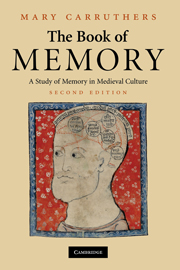Book contents
- Frontmatter
- Contents
- List of Illustrations
- Preface to the second edition
- List of Abbreviations
- Introduction
- CHAPTER 1 Models for the memory
- CHAPTER 2 Descriptions of the neuropsychology of memory
- CHAPTER 3 Elementary memory design
- CHAPTER 4 The arts of memory
- CHAPTER 5 Memory and the ethics of reading
- CHAPTER 6 Memory and authority
- CHAPTER 7 Memory and the book
- Appendix A
- Appendix B
- Appendix C
- Notes
- Bibliography
- Index of manuscripts
- General Index
CHAPTER 1 - Models for the memory
Published online by Cambridge University Press: 05 January 2014
- Frontmatter
- Contents
- List of Illustrations
- Preface to the second edition
- List of Abbreviations
- Introduction
- CHAPTER 1 Models for the memory
- CHAPTER 2 Descriptions of the neuropsychology of memory
- CHAPTER 3 Elementary memory design
- CHAPTER 4 The arts of memory
- CHAPTER 5 Memory and the ethics of reading
- CHAPTER 6 Memory and authority
- CHAPTER 7 Memory and the book
- Appendix A
- Appendix B
- Appendix C
- Notes
- Bibliography
- Index of manuscripts
- General Index
Summary
TABULA MEMORIAE
Readers who are familiar with a current opinion that there are radical differences between oral culture (based upon memory) and literate culture (based upon writing) may be puzzled by the very title of this book, and even consider it self-contradictory. My source, however, is Dante, who was newly articulating a very old observation. Even the earliest writers I discuss did not operate within a culture that could be described as fully oral. Yet for all these writers, memory is a central feature of knowledge – its very basis in fact – whether through recollection (as for Plato) or as the agent building experience (as for Aristotle). This emphasis upon memory persists, shared by societies varying widely in the availability of books to readers: that is, in their literacy. (I am adopting here Eric Havelock’s useful definition of “literacy” as coterminous with “book-acquiring public.”)
In none of the evidence is the act of writing itself regarded as a supplanter of memory, not even in Plato’s Phaedrus. Rather books are themselves memorial cues and aids, and memory is most like a book, a written page or a wax tablet upon which something is written. Cicero writes about the relationship of writing to memory in his elementary work, Partitiones oratoriae:
[M]emory . . . is in a manner the twin sister of written speech [litteratura] and is completely similar to it [persimilis], [though] in a dissimilar medium. For just as script consists of marks indicating letters and of the material on which those marks are imprinted, so the structure of memory, like a wax tablet, employs places [loci] and in these gathers together [collocat] images like letters.
Information
- Type
- Chapter
- Information
- The Book of MemoryA Study of Memory in Medieval Culture, pp. 18 - 55Publisher: Cambridge University PressPrint publication year: 2008
Accessibility standard: Unknown
Why this information is here
This section outlines the accessibility features of this content - including support for screen readers, full keyboard navigation and high-contrast display options. This may not be relevant for you.Accessibility Information
- 2
- Cited by
